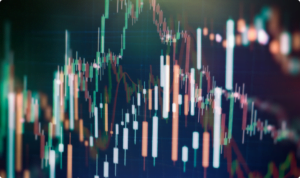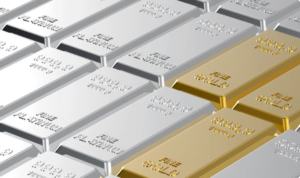More

Platinum Bar 1 Ounce
People, in general, buy things they need or want. Investors buy things they think can be sold for a profit. It’s a fundamental difference, but one that new (and many not-so-new) investors confuse all the time.
How does this apply to platinum? In some very fundamental ways. Few people wake up and say, “I’d like to buy some platinum.” It’s not that high on most people’s need or want lists.
However, it’s something that can be sold for a profit. Here’s why—and how.

The key to making a profit on platinum is that its price goes up and down. This sounds simple enough to be ridiculous, but it is c.
If the price always went down, it would be no investment at all. Everyone who bought it would be a loser.
If the price always went up, all supplies would be bought up and kept, with only rare sales. Everyone who bought it would be a winner, but there would be very few people in that category. (Even fewer as time goes by—as strong hands bought up all the supplies.)
Fluctuating prices create a robust market for the metal (as for all investments that trade freely). But they also create winners and losers. The key is to be one of the winners—which is well within reach for most investors if the market is liquid.

Fortunately, Platinum is a Highly Liquid Asset
Platinum is bought and sold daily on the COMEX (tons of it per year), in wholesale quantities for industry, and through physical coins and bars via precious metals brokers.
In terms of its availability, platinum is considered by many industry insiders as the most precious of the precious metals. By this, they mean that it’s exceptionally hard to mine; little of it is mined each year, and above-ground stores are almost amazingly small.
If that sounds like a contradiction—that little of it is mined, yet tons of it trade on COMEX each year—consider this: a six-inch cube of platinum weighs as much as an average man. A cubic foot of the metal weighs 1,330 pounds—well over half a ton. It’s heavy stuff.
But consider this, too. When you hold a one-ounce platinum coin in your hand, you have something that came from seven to 12 tons of ore, mined up to a mile underground, that takes six months to extract. The amount of platinum mined each year is only 130 tons—about six percent by weight of the gold mined each year, and less than one percent of silver. All the platinum ever mined could fit in a cube only 25 feet on a side!
Platinum is truly a precious metal. But—say the naysayers—platinum’s primary use today is in catalytic converters used in diesel vehicles. And the world is going to electric vehicles, which use no platinum. The coming effect on the platinum investing world will be akin to that which devastated the silver investing world when digital cameras made film cameras obsolete (film required silver to develop photographs).
All of this is true. Silver, which sold for less than $10 per ounce in the late 1990s (before the digital camera revolution), was deeply affected by the reduction in its industrial use. Still, in 2020 it sold for over $25/oz., and even reached over $50/oz. in 2011. Clearly, more than industrial use accounts for the price of precious metals.
To this day, silver goes up and down in price. But on its worst day it sells for more dollars than it did in 1999. Though it sells in times of crisis as a precious metal, it sells in normal times as a primarily industrial metal—just like platinum.
And, just like silver, platinum also rises and falls in price. Hence the opportunity for investors.
Despite platinum’s inherent high value (which might appeal to you for its own merits), McAlvany Precious Metals tends to use platinum coins for their value in ratio trading. Ratio trading entails moving out of one metal into another when their relative worth makes one expensive compared to the other. You trade out of the relatively expensive metal into the relatively inexpensive one. Then, as the two metals’ relative worth reverses (as it always does, though the process often takes several years), you again move from expensive to inexpensive. The process continues indefinitely and can double or triple (or more) your ounces in your target precious metal. It’s a long-term strategy but incredibly safe and highly profitable.
There’s a reason for this tendency to ratio trade into silver or gold. True money has seven characteristics: it must be durable, divisible, convenient, consistent, possess value in itself, be limited in available quantity, and have a long history of acceptance.
Platinum has all these characteristics except the last. Why? We’ve mentioned how rare and hard to mine it is. It wasn’t even significantly recognized as a distinct element until the 18th century. And it is usable in current quantities only because, with modern technology, it is now mined in sufficient quantities. So, historically, it’s a newcomer to the precious metals palette. But given its nature, desirability, and usefulness, which parallel those of silver and gold in so many ways, platinum may well function as money in a fiat currency failure.
Until this unknown factor becomes known, however, McAlvany Precious Metals will likely treat platinum (and palladium, for similar reasons) as a way to increase your stores of known monetary metals such as silver or gold.

Still, given its merits, you might want to look into platinum as an investment in its own right. You might know that, though the catalytic converter issue is real, it’s not the end of the story. In the clean, renewable energy world, hydrogen fuel cell electric vehicles show considerably more promise than solely battery-run electric vehicles. EVs have quite a head start on fuel cell vehicles in the market, which could be decisive, but that could also change due to current energy challenges that existing green technologies cannot meet. And hydrogen vehicles use platinum for the vital energy conversion process from hydrogen to propulsion and electricity for battery charging. (The byproduct of this immensely powerful energy conversion is pure water—not bad when it comes to clean energy.)
You might also want to invest in platinum because, at current prices, it is an intermediately priced precious metal. It sells for quite a bit more than silver and less than half the price of gold at this writing. That might be a fit for your budget.
Whatever the case, don’t ignore platinum. It has immensely important characteristics for industry and is an extremely valuable and truly beautiful metal. Your dollars will, over time, tend to their true worth—which is zero. Platinum will do the same—except that its true worth is very great indeed. And on its path to that destination, it will have plenty of ups and downs—translation: opportunity—for astute investors.
To help you judge where platinum is in its ratio to dollars, silver, or gold, call McAlvany Precious Metals today and talk to a knowledgeable advisor.
For more information: https://medium.com/@allwastematters/10-interesting-facts-about-platinum-that-will-make-you-consider-refining-it-e863537d891f
Get a personally tailored plan specific to your financial goals and needs. Connect with an advisor today.